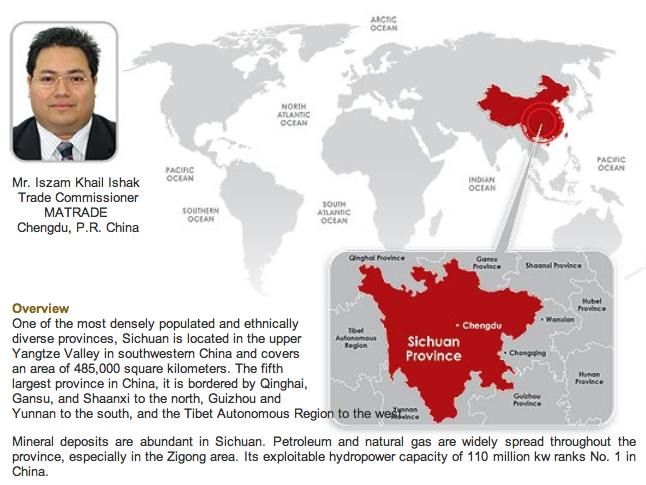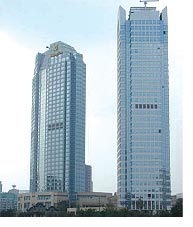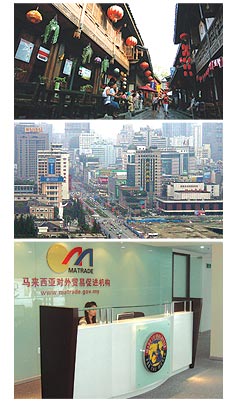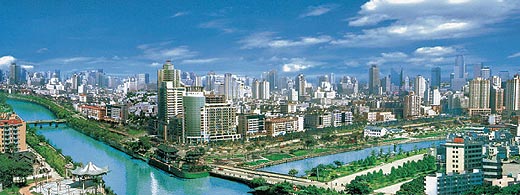Sichuan Province, People’s Republic Of China

Along with the considerable industrial development over the years, Sichuan has become the strongest province in western China in terms of overall economic strength. It has a good natural environment, abounds in specialty products and has an ample labour force.
Economic growth is especially pronounced in Chengdu, Mianyang and Leshan. Its total value of production and social commodity retail account for a quarter of the total for all the 12 provinces and autonomous regions in west China.
Chengdu, the provincial capital, is the trading, transportation, industrial, and cultural center of the western part of China. As the key city of the ‘Chengdu-Chongqing Economic Zone’, Chengdu covers an area of 12,400 kilometers, with a total population of more than 11 million.
Economy Indicators
The economy in Sichuan has grown steadily and in a sustainable way. In 2008, this economic powerhouse’s provincial GDP reached RMB1.25 trillion or USD182.89 billion, ranking 9th in the country and 1st in western China.
The principal economy indicators of Sichuan:

* b – Billion; All figures are official and updated till end year 2007.
 External Trade
External Trade
In 2008, despite adverse factors such as the global financial crisis and the powerful earthquake on 12 May 2008, foreign trade in Sichuan continued to progress significantly. Total exports amounted to USD13.11 billion, a year-to-year increase of 52.3%. Major exports included integrated circuits (IC) and micro-electronics, garments, steel products, boilers, drilling machinery and accessories. Major exports destinations were Hong Kong, USA, India, Indonesia, Russia and Japan.
Total imports in 2008 were valued at USD8.93 billion, an increase of 54.7%. Major imports were integrated circuits (IC) and micro-electronics, minerals, steel products, automotive and spare parts, measuring, testing and analysing auto-control apparatus, mainly from the USA, Japan, Hong Kong, Germany and South Korea.
Bilateral Trade with Malaysia
Sichuan and Malaysia enjoy a good bilateral trade relationship. In 2008, total trade value between the two countries amounted to USD507.29 million. Sichuan’s total exports to Malaysia in 2008 were valued at USD415.27 million, which is 3.2% of the total provincial export value. Major exports to Malaysia are electrical and mechanical, cereals and oil products, livestock and agri-products, light industry and textile products, construction material, chemicals and by-products. However, in the same year, Malaysia’s exports to Sichuan dropped 25.7% year-to-year to USD92.02 million, which is a mere 1.0% of the provincial total import value. Major imports from Malaysia are palm oil, rubber, wood and base metal.
New Opportunities in Sichuan
A recent study has shown that there will be a provincial demand for major construction materials from 2008 to 2010. The shortage of construction steel products is forecast at 11.3 million tons; the shortage for cement at 30.8 million tons, and the shortage for timber at 5.45 and 4.95 million cubic meters over the next two years respectively.
 Chengdu presents numerous new opportunities for trade and investment. According to the city government’s strategic plan, six industry bases will be developed in the area, covering information technology, machinery/automobile, pharmaceutical, food/tobacco, metallurgy/construction-material and petroleum products, to gradually form industrial zones aimed at hi-tech, manufacturing and characteristic sectors. Halal food is another area that can be explored since Sichuan is the gateway to neighbouring provinces where there is a high demand for Halal products.
Chengdu presents numerous new opportunities for trade and investment. According to the city government’s strategic plan, six industry bases will be developed in the area, covering information technology, machinery/automobile, pharmaceutical, food/tobacco, metallurgy/construction-material and petroleum products, to gradually form industrial zones aimed at hi-tech, manufacturing and characteristic sectors. Halal food is another area that can be explored since Sichuan is the gateway to neighbouring provinces where there is a high demand for Halal products.
With a population of more than 87 million, Sichuan holds many opportunities for the education sector, especially when it comes to attracting Chinese students to study in Malaysia for tertiary education. The setting up of international schools is another sector with great potential due to the influx of foreign expatriates to the province as 135 of the top 500 Fortune companies have their operations here. Currently, there are three National Development Zones in Sichuan, comprising two Hi-tech Industrial Development Zones and one Economic and Technological Development zone. In addition, Export Processing Zone has been set up in Chengdu Hi-tech Industrial Development Zone.
The Western China Development and designated National Development Zones in Sichuan offers a number of favourable policies for foreign investors including taxation advantages, helpful administration personnel, quick customs clearance, easy-to-obtain production permits and so much more.

| For further enquiries, please contact MATRADE Chengdu at: Malaysia External Trade Development Corporation, Chengdu Representative Office, Level 14, Unit 1402-1404, The Office Tower, Shangri-La Centre, 9 Binjiang Road East, Chengdu 610021, Sichuan Province, People’s Republic of China. |
| Telephone : +86 28 6687 7517 | Facsimile : +86 28 6687 7524 | Email : chengdu@matrade.gov.my |
